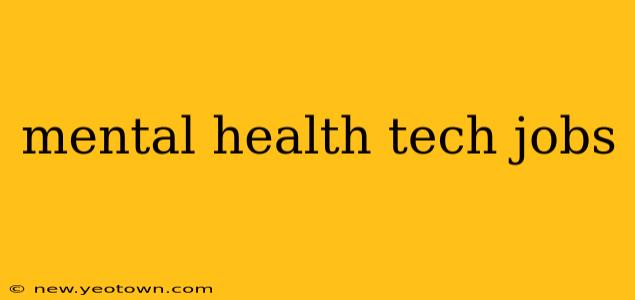The digital world is transforming how we approach mental wellness, creating a surge in demand for professionals in the exciting field of mental health technology. This isn't just about creating apps; it's about building a future where accessible, personalized mental healthcare is a reality for everyone. Let's dive into the diverse and rapidly evolving landscape of mental health tech jobs.
My journey into researching this field started with a simple question: How can technology genuinely improve access to mental health services? The answer, it turns out, is multifaceted and incredibly rewarding. From the cutting edge of AI-powered diagnostics to the compassionate human touch of telehealth support, the opportunities are boundless.
What are the Different Types of Mental Health Tech Jobs?
The beauty of this field lies in its diversity. It's not a one-size-fits-all industry; it welcomes a wide range of skill sets and passions. We're not just talking about software engineers; we need clinicians, designers, marketers, and project managers, all working together to create a holistic approach to mental wellbeing.
Software Engineers & Developers:
This is the backbone of the industry. These individuals build the apps, platforms, and tools that deliver mental healthcare services. Whether it's developing AI algorithms for personalized treatment plans or creating user-friendly interfaces for telehealth platforms, software engineers are crucial. Their expertise ranges across various programming languages and development frameworks, ensuring seamless functionality and scalability.
Data Scientists & Analysts:
The data generated by mental health tech platforms is invaluable. Data scientists and analysts play a vital role in interpreting this data, identifying trends, and improving the effectiveness of the technology. They help personalize interventions, predict potential risks, and optimize the overall user experience.
UX/UI Designers:
Creating an intuitive and supportive user experience is paramount in mental health tech. UX/UI designers are responsible for ensuring that apps and platforms are user-friendly, accessible, and promote a sense of comfort and trust. They consider everything from the app's visual appeal to its overall usability.
Clinical Psychologists & Therapists:
The human element remains central. Clinical psychologists and therapists are often involved in designing, testing, and implementing mental health tech solutions. They ensure that the technology aligns with clinical best practices and provides ethical, effective care.
Project Managers & Product Managers:
These individuals oversee the entire development lifecycle of mental health tech products. They manage teams, budgets, and timelines, ensuring projects are delivered on time and within budget while maintaining a high standard of quality.
Marketing & Sales Professionals:
Getting the word out about these crucial services is key. Marketing and sales professionals play a vital role in raising awareness, reaching target audiences, and driving adoption of mental health tech solutions.
What Skills are Needed for Mental Health Tech Jobs?
The skill set required varies depending on the specific role, but some common threads run through many positions. Strong technical skills are vital for those in software development and data science. However, empathy, understanding of mental health issues, and excellent communication skills are crucial across the board.
Technical Skills: Programming languages (Python, Java, JavaScript), data analysis tools, AI/ML knowledge, cloud computing, UX/UI design principles.
Soft Skills: Empathy, communication, problem-solving, teamwork, adaptability, and a passion for improving mental healthcare access.
How Can I Get a Job in Mental Health Tech?
The field is competitive, but opportunities abound. Gaining relevant experience through internships, volunteer work, or personal projects is a great starting point. Networking within the industry is also essential. Attending conferences, joining relevant online communities, and connecting with professionals on LinkedIn can open doors to exciting possibilities. Finally, showcasing a genuine passion for improving mental health access will set you apart from the rest.
What are the Future Trends in Mental Health Tech Jobs?
The future is bright for mental health tech. We can expect to see continued growth in AI-powered tools, increased integration of wearable technology, and a greater focus on preventative care. The demand for professionals with expertise in these areas will only increase.
This journey into the world of mental health tech jobs has been eye-opening. It's a field where technology meets compassion, offering the potential to revolutionize how we approach mental wellbeing. The future is not just about technological advancement; it’s about building a healthier, happier world, one innovative solution at a time.

